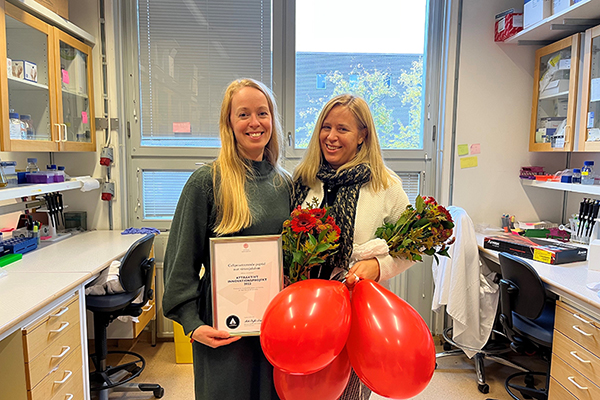Five new projects have received the Attractive Innovation Project award after having made important progress on the way from idea to innovation. With six projects receiving this award from UU Innovation earlier this year, there are a total of eleven awarded projects in 2022. All projects have received support from UU Innovation.
The last five in a row that have been celebrated with diplomas and flowers show different ways in which the results of the research can be utilised. In several cases, researchers have sold or licensed intellectual property rights to companies that are well placed to take the projects on to the innovation stage. In other cases, the research teams have chosen to take products or services to the market by starting companies for commercialisation under their own auspices.
These are the projects:
Cell-penetrating peptide against viral disease
The research team has developed a peptide that can penetrate cell membranes and be transported into cells, thereby inhibiting diseases caused by viruses, such as Covid-19. Behind the new and patented technology are Ylva Ivarsson, professor of biochemistry at the Department of Chemistry – BMC, Anna Överby Wernstedt, professor at Umeå University, and Jakob Nilsson, professor at the University of Copenhagen. To give the technology the best possible conditions to benefit, the team has transferred the rights to a partner who is responsible for identifying companies that want to take over the innovation project, such as pharmaceutical companies. The team has an option for future income from a commercialisation.
Orchis Natur
Orchis Natur grows European wild orchids for nature conservation measures such as reintroductions and to counteract the extinction of endangered populations. The methods used are based on the latest research in conservation biology and population genetics. Linus Söderquist, doctoral student in botanical ecology, and Simon Hultby, gardener at Uppsala Linnean Gardens are behind the company. Orchis Natur targets municipalities, county administrative boards and non-profit associations and has had its first customers during the year.
Read more: Breathing new life into orchids
CombiANT
Researchers Nikos Fatsis-Kavalopoulos, Po-Cheng Tang, Roderich Römhild, Dan Andersson and Johan Kreuger have developed and applied for a patent for the CombiANT method with which the combination effects of different antibiotics can be investigated. Combination therapies are common in healthcare, despite the fact that until now there has not been an easy way to evaluate their effect. The research team's hope is that their method will eventually lead to the prescribing of active combinations of antibiotics to each patient, which can also contribute to a reduced resistance to antibiotics. The team has founded Rx Dynamics AB and as a first step has started sales to customers conducting research. Continued commercialisation of the product takes place with the support of financing from Vinnova and investment from UU Invest AB.
Read more: How innovation from Uppsala University can reduce antibiotic-resistant bacteria
Manufacturing method for stable perovskite solar cells
Perovskite is a material that has received a lot of attention for its ability to produce lightweight, flexible and cheaper solar cells. Gerrit Boschloo, professor at the Department of Chemistry – Ångström, has, within the framework of a project funded by SSF, developed a method for the manufacture of a solar cell module in which perovskite solar cells are connected in an efficient way. A patent has been applied for the method and transferred to a company for further development and commercialisation.
Secretion Effect Detection (SED) technology
Daniel Camsund, former researcher at the Department of Cell and Molecular Biology, has developed and patented a new technology, SED, that can speed up the development of new biological drugs. SED combines synthetic biology with microflow technology and can be used to measure the effects of various biomolecules secreted from cells, for example when screening new candidate drugs. The patent application and the innovation project have been sold to an international biotechnology company that will develop the technology further towards a commercial product.
Read more: Successful matching in UU Innovation's mentor programme
